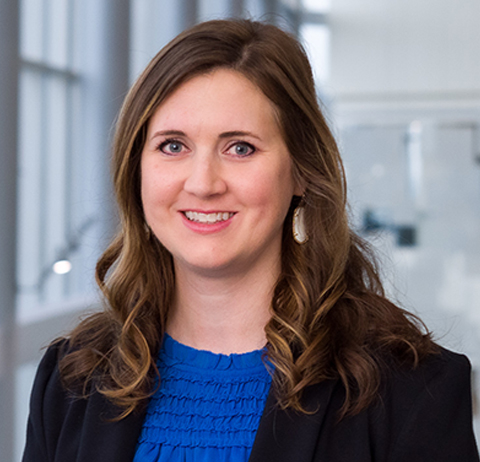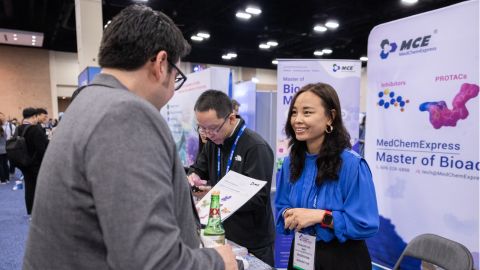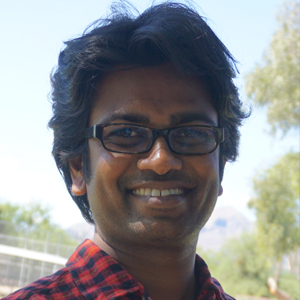'Don’t be afraid to take a different path'
During a summer research program when she was a biochemistry undergrad at Abilene Christian University in Texas, Rebecca Ann Faulkner worked in a polymer chemistry lab that synthesized compounds for biomedical applications. This experience inspired her to study biomedical science.
At the University of Texas Southwestern Medical Center in Dallas, Faulkner earned a Ph.D. in cellular and molecular biology with an emphasis on cell regulation. Her research focused on the pathways in the cellular quality control system that balance protein synthesis and degradation. She was particularly interested in endoplasmic reticulum–associated degradation, or ERAD, of integral membrane proteins with special attention on the enzyme that catalyzes the rate-limiting step in the mevalonate pathway, which synthesizes sterols and is, therefore, a molecular target of drugs, including statin drugs that are used to treat lipid disorders.

Faulkner pursued postdoctoral training with Ezra Burstein at UTSW. Her collaborative project identified and characterized a protein complex involved in retromer-independent endosomal cargo recycling, a novel cargo-sorting complex that contributes to maintaining cellular homeostasis.
“I was fascinated by how interconnected cellular processes are and how their dysregulation can lead to disease,” she said.
In 2016, Faulkner paused her career for four years to focus on her family, a decision that she believes made her a more effective and empathetic scientist.
“Stepping away from the lab to raise my children gave me a renewed perspective and a deeper understanding of the importance of work–life balance,” she said. “I returned to science with a clear vision of what I wanted to achieve and a passion to explore lipid metabolism further.”
Faulkner's research is now centered on the sterol-sensing mechanisms that regulate lipid homeostasis. Her recent findings have shown that sterols directly interact with the membrane domain of this enzyme to initiate sterol-induced endoplasmic reticulum–associated degradation. This work has implications for strategies to combat hypercholesterolemia and atherosclerosis.
“Our research could lead to alternative treatments for cardiovascular diseases, which is incredibly exciting,” she said.
Faulkner is now a scholar in the American Society for Biochemistry and Molecular Biology’s Maximizing Opportunities for Scientific and Academic Independent Careers, or MOSAIC, program, which provides recipients of National Institutes of Health K99/R00 awards with mentorship, grant-writing workshops, peer networking and other professional support.
“The MOSAIC program has been instrumental in my career development, providing me with the tools and support needed to advance my research,” she said.
The program's emphasis on diversity and inclusion resonates with Faulkner. “I’m committed to helping other scientists find that balance between career and family, just as I have,” she said.
She encourages aspiring scientists to seek out mentors and collaborators who can provide guidance and support, emphasizing that diverse perspectives and experiences are crucial for scientific innovation.
“Don’t be afraid to take a different path,” she said. “With determination and the right support, you can achieve excellence in science while maintaining a fulfilling personal life.”
Enjoy reading ASBMB Today?
Become a member to receive the print edition four times a year and the digital edition monthly.
Learn moreGet the latest from ASBMB Today
Enter your email address, and we’ll send you a weekly email with recent articles, interviews and more.
Latest in Opinions
Opinions highlights or most popular articles

Embrace your neurodivergence and flourish in college
This guide offers practical advice on setting yourself up for success — learn how to leverage campus resources, work with professors and embrace your strengths.

Survival tools for a neurodivergent brain in academia
Working in academia is hard, and being neurodivergent makes it harder. Here are a few tools that may help, from a Ph.D. student with ADHD.

Hidden strengths of an autistic scientist
Navigating the world of scientific research as an autistic scientist comes with unique challenges —microaggressions, communication hurdles and the constant pressure to conform to social norms, postbaccalaureate student Taylor Stolberg writes.

Black excellence in biotech: Shaping the future of an industry
This Black History Month, we highlight the impact of DEI initiatives, trailblazing scientists and industry leaders working to create a more inclusive and scientific community. Discover how you can be part of the movement.

Attend ASBMB’s career and education fair
Attending the ASBMB career and education fair is a great way to explore new opportunities, make valuable connections and gain insights into potential career paths.

Benefits of attending a large scientific conference
Researchers have a lot of choices when it comes to conferences and symposia. A large conference like the ASBMB Annual Meeting offers myriad opportunities, such as poster sessions, top research talks, social events, workshops, vendor booths and more.

